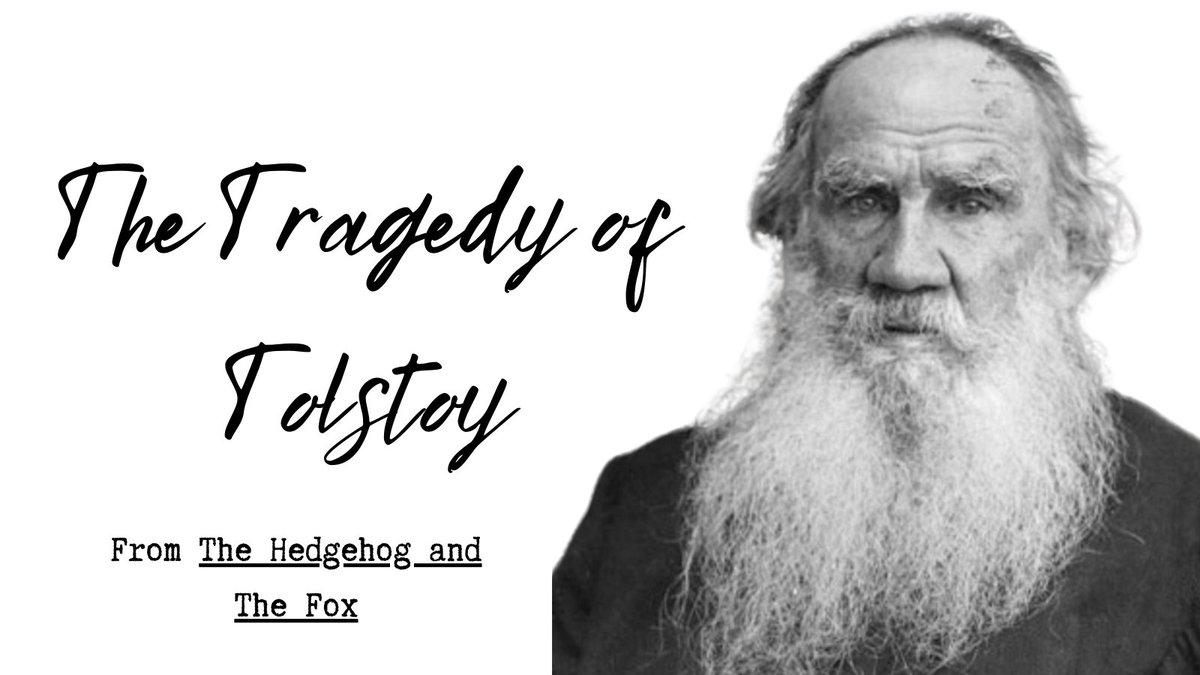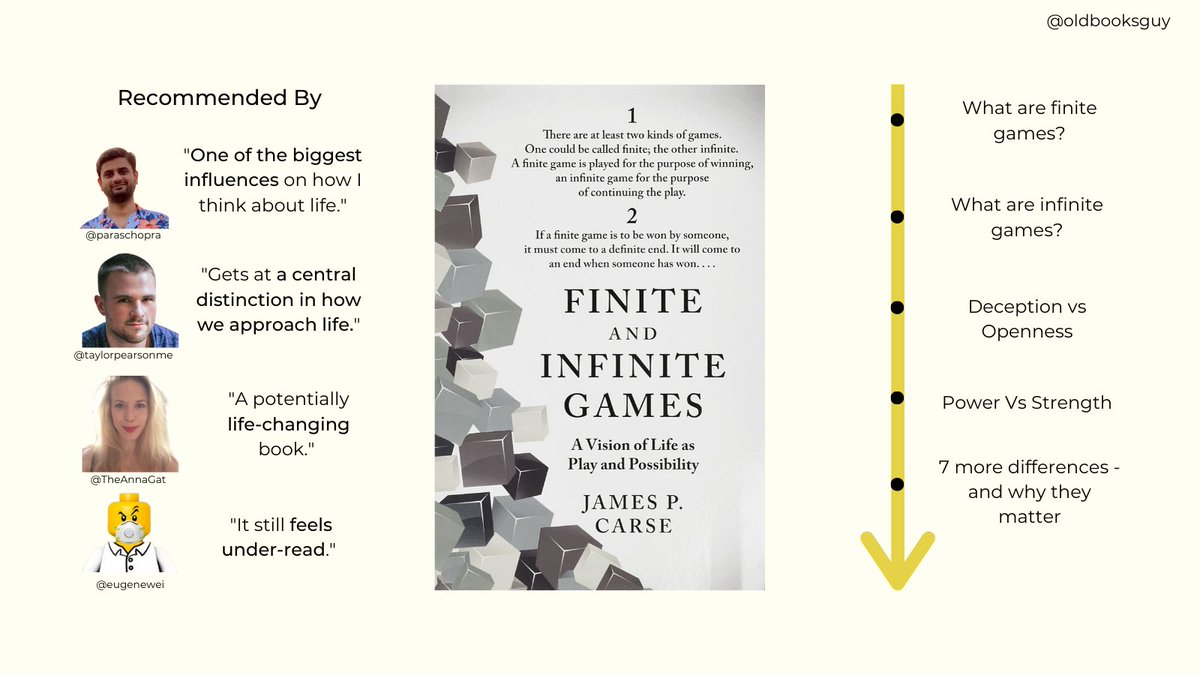
Big Nietzsche Thread🧵
Nietzsche has given me jolts of clarity more often than any other thinker
23 ideas from Nietzsche that are as useful as they're interesting👇
Nietzsche has given me jolts of clarity more often than any other thinker
23 ideas from Nietzsche that are as useful as they're interesting👇
Nietzsche writes: "It requires more genius to spend than to acquire."
To acquire money, you learn what's profitable & repeat it
But to spend, you must answer hard questions:
- What's *worth* spending on?
- What makes me *content*?
Spending well is tougher than acquiring a lot
To acquire money, you learn what's profitable & repeat it
But to spend, you must answer hard questions:
- What's *worth* spending on?
- What makes me *content*?
Spending well is tougher than acquiring a lot
Philosophers say life is worthless
But Nietzsche says "the value of life cannot be estimated."
A living person can't judge the value of life as "he's party to the dispute."
Those who think life is worthless are themselves sick - "decadents" on shaky legs
But Nietzsche says "the value of life cannot be estimated."
A living person can't judge the value of life as "he's party to the dispute."
Those who think life is worthless are themselves sick - "decadents" on shaky legs
Nietzsche says "the modern intellect" tries to hide its flaws in "moralistic attire"
The "inability to affirm or negate" is called tolerance
The "want of personality" is called objectivity
A dull collection of facts is called science - all "addition instead of composition."
The "inability to affirm or negate" is called tolerance
The "want of personality" is called objectivity
A dull collection of facts is called science - all "addition instead of composition."
An important consequence of the death of God:
"Antagonisms arise between the true, the beautiful, and the good."
Before, these are united in God
Now, truth is neutered without beauty
Beauty is lost without morality
Morality doesn't convince without an absolute reality
"Antagonisms arise between the true, the beautiful, and the good."
Before, these are united in God
Now, truth is neutered without beauty
Beauty is lost without morality
Morality doesn't convince without an absolute reality
Stop being busy
A "raging industriousness" might give you wealth and honor
But it will also drain you - make your senses blunt and less subtle
Work delivers, but also extracts - time, energy, one's enthusiasm
Work is a trade - important to keep track of what one *gives away*
A "raging industriousness" might give you wealth and honor
But it will also drain you - make your senses blunt and less subtle
Work delivers, but also extracts - time, energy, one's enthusiasm
Work is a trade - important to keep track of what one *gives away*
Purpose, unity, and truth are now lost
People now believe "existence achieves nothing" - no purposeful movement toward the future
There is no "overarching unity" - just a maddening "multiplicity of events"
Truth is on slippery grounds
But there's a way out
People now believe "existence achieves nothing" - no purposeful movement toward the future
There is no "overarching unity" - just a maddening "multiplicity of events"
Truth is on slippery grounds
But there's a way out
Before condemning the world, we should see if can deprive purpose, unity, and truth "of their value"
Why should the world have a known and final purpose?
Why should reality have unity and not chaos?
Do we *need* truth in order to thrive and expand life in interesting new ways?
Why should the world have a known and final purpose?
Why should reality have unity and not chaos?
Do we *need* truth in order to thrive and expand life in interesting new ways?
Nietzsche predicts the internet?
He says: In modern times, the "abundance of disparate impressions is greater than ever"
"The ability to take initiative" is lost
People are "accustomed to being overwhelmed" and all they can do is "react to external stimuli."
Written in 1880s
He says: In modern times, the "abundance of disparate impressions is greater than ever"
"The ability to take initiative" is lost
People are "accustomed to being overwhelmed" and all they can do is "react to external stimuli."
Written in 1880s
A profoundly important question posed by Nietzsche:
"Is this modern world of ours a rising civilization or an exhausted one?"
This is THE question.
"Is this modern world of ours a rising civilization or an exhausted one?"
This is THE question.
Nietzsche describes 3 modern vices:
1. Overwork
To be constantly busy is self-negation
It betrays "a will to forget" oneself
2. Curiosity
Vague curiosity about everything, without deep obsessions, goes nowhere
3. Sympathy
Sympathy for all = a refusal to rank good & bad
1. Overwork
To be constantly busy is self-negation
It betrays "a will to forget" oneself
2. Curiosity
Vague curiosity about everything, without deep obsessions, goes nowhere
3. Sympathy
Sympathy for all = a refusal to rank good & bad
Nietzsche hated the bloat of bureaucracies
He writes: "The state has a preposterously fat belly."
"Besides those who do the actual work," we see all sorts of useless intermediaries
Life has become expensive because of too many "middlemen"
He writes: "The state has a preposterously fat belly."
"Besides those who do the actual work," we see all sorts of useless intermediaries
Life has become expensive because of too many "middlemen"

Remorse is CRINGE
Consider your actions "experiments and questions"
They're nothing but "attempts to find out something"
Important "answers" come with both favorable and unfavorable outcomes
To regret is to leave your past self "in the lurch" - Nietzsche calls it "indecent"
Consider your actions "experiments and questions"
They're nothing but "attempts to find out something"
Important "answers" come with both favorable and unfavorable outcomes
To regret is to leave your past self "in the lurch" - Nietzsche calls it "indecent"
Nietzsche asks: "Are you genuine? Or only an actor?"
He writes even great men are often nothing but "the apes of their ideals."
Who you admire determines what you become.
He writes even great men are often nothing but "the apes of their ideals."
Who you admire determines what you become.
Nietzsche writes for the 17th century, reason was supreme & the world was knowable through the intellect
For the 18th century, emotions were supreme & the world was knowable through the heart
For the 19th century, man's appetite was supreme - his animal nature became central
For the 18th century, emotions were supreme & the world was knowable through the heart
For the 19th century, man's appetite was supreme - his animal nature became central
The cost of God's death:
"Man has suffered an incredible loss of dignity in his own eyes."
He went from playing "the central part and tragic hero in the drama of existence" to being a random mote flying through space.
"Man has suffered an incredible loss of dignity in his own eyes."
He went from playing "the central part and tragic hero in the drama of existence" to being a random mote flying through space.
"He who has let go of God clings all the more tenaciously to his belief in morality."
- Nietzsche.
👀
- Nietzsche.
👀

In the past, fairy tales & miracles were a release from a world that worked according to "iron necessity."
Today, science is a release from a world with no metaphysical certainties.
Science acts as the only piece of "firm old earth" for people for whom everything is fickle
Today, science is a release from a world with no metaphysical certainties.
Science acts as the only piece of "firm old earth" for people for whom everything is fickle

It's hard to be disingenuous or inauthentic over the long term.
Nietzsche writes: "It always shows what has weight for us and what does not."
Concern, love, interest - hard to meaningfully fake
Nietzsche writes: "It always shows what has weight for us and what does not."
Concern, love, interest - hard to meaningfully fake
Why has freestyle verse replaced rhyming poetry?
The world is moving away from *melody* because it "delights so openly in lawfulness."
Melody has a disdain for "everything still unformed and arbitrary."
Melody - a painful reminder of an orderly, now lost, world?
The world is moving away from *melody* because it "delights so openly in lawfulness."
Melody has a disdain for "everything still unformed and arbitrary."
Melody - a painful reminder of an orderly, now lost, world?
Religious wars as PROGRESS?
Religious wars show the masses have become subtle enough "to treat concepts with respect."
Religious wars are only possible when people realize that mental concepts shape physical outcomes
For Nietzsche, this signifies the growth of the common mind
Religious wars show the masses have become subtle enough "to treat concepts with respect."
Religious wars are only possible when people realize that mental concepts shape physical outcomes
For Nietzsche, this signifies the growth of the common mind
Formerly, all art was made to "commemorate high and happy moments."
Now, Nietzsche writes, art is made to offer a "brief lustful moment" to people who are "wretched, exhausted, and sick."
Art was a celebration.
Now it is a fake escape.
Now, Nietzsche writes, art is made to offer a "brief lustful moment" to people who are "wretched, exhausted, and sick."
Art was a celebration.
Now it is a fake escape.
Institutions are dying as we've lost:
- The will to authority
- The solidarity between "succeeding generations backwards and forwards"
Democracy erodes institutions
The desire to take on "centuries-long responsibility" is replaced by the desire to win the next election
- The will to authority
- The solidarity between "succeeding generations backwards and forwards"
Democracy erodes institutions
The desire to take on "centuries-long responsibility" is replaced by the desire to win the next election
Our debt to danger
Danger forces us to take a good hard look at ourselves
Danger makes us take stock of:
- Our resources
- Our virtues
- "Our shield and spear"
Nietzsche writes: "One must *need* strength, otherwise one will never have it."
Danger forces us to take a good hard look at ourselves
Danger makes us take stock of:
- Our resources
- Our virtues
- "Our shield and spear"
Nietzsche writes: "One must *need* strength, otherwise one will never have it."
Thanks for reading!
Want to learn about Nietzsche's brilliant theories on the origin of poetry?
Read my piece👇
memod.com/jashdholani/ni…
Want to learn about Nietzsche's brilliant theories on the origin of poetry?
Read my piece👇
memod.com/jashdholani/ni…
Nietzsche: "Consciousness is the last and latest development of the organic and hence also what is most unfinished and unstrong."
In this piece I discuss the downsides of consciousness and why you should trust your instincts more
Read on👇
memod.com/jashdholani/be…
In this piece I discuss the downsides of consciousness and why you should trust your instincts more
Read on👇
memod.com/jashdholani/be…
• • •
Missing some Tweet in this thread? You can try to
force a refresh








